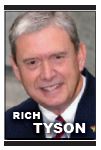By Richard Tyson
I don’t know what I don’t know. And sometimes, I don’t know what I think I know.
This may come as a strange admission by a man who has spent most of his career coaching CEOs and business owners, but it is precisely why we each need coaches, mentors and advisors.
One of the most important business advisors I have relied on is Ralph Waldo Emerson. Of course, I didn’t have the privilege of knowing him personally, but I have learned by studying his life and philosophies. He strongly encouraged us to continuously observe, read and engage.
By energetically doing each of these things, we begin to illuminate the darkness that surrounds those things that we don’t know, as well as exposing the biases that may also obscure our view of reality.
Observation is defined as the action or process of observing something carefully in order to gain knowledge. In today’s high-tech world, I fear that most of us have substituted Internet searches for real observation. While Wikipedia can be a great source of information, we need to take care that we don’t allow it or other online resources to become the ultimate measuring stick for reality. Emerson, I think, would coach us to augment our virtual learning with real-life observations.
Reading was the centerpiece of Emerson’s life. It is said that he read every volume in the Harvard library. While that is not a reasonable aspiration for most of us, it is clear that reading books and other publications enriches our understanding of the world and the perspectives of others. It broadens our field of observation.
Perhaps the most important Emersonian recommendation is that of engagement. It is here that we as business leaders often have our greatest struggle. Several factors mitigate against our engagement with our key constituents, namely our customers, fellow executives, employees, suppliers, etc. These include:
• Our egos create a cloud of confirmation bias, the tendency to search for, interpret, favor and recall only that information that supports our beliefs or values.
• We subconsciously (and sometimes consciously) categorize others in terms of our perceived value of their ideas.
• We slip from a sense of common vision and purpose to being calcified around a position, strategy or tactic.
These factors work against engagement. They cause us to filter out anything that challenges or disagrees with our way of thinking. We fail to listen, or if we listen, we don’t hear. And in doing this, we run the risk of not learning what we don’t know. This can be fatal to any enterprise.
I firmly believe that Emerson’s assertion that we must engage with one another means that we invite differing viewpoints, even disagreement. This, however, does not mean that we need to be contentious, unfriendly or unkind. The relationship of the late U.S. Supreme Court justices Ruth Bader Ginsburg and Antonin Scalia is a sterling example of two diametrically opposed jurists who strived diligently to understand each other and never allowed their deep-seated beliefs to diminish their friendship.
On the first day of a job early in my career, I found myself at a conference table with 16 MBAs who were my fellow product managers at a Fortune 100 company. At the head of the table was our boss, a senior vice president of the corporation.
Going into the meeting, this VP turned to me and said, “We expect everyone in these meetings to speak up.” I demurred, saying that I thought it was a good idea that I just listen, as it was my first day.
My boss firmly reiterated that I would be expected to give my thoughts in the course of the meeting. I didn’t argue, but I also didn’t speak up. After about two hours, the VP turned to me and demanded that I speak.
With no choice, I offered a few ideas. To my dismay, my boss reprimanded me, using a stream of profanity. He asserted that I had wasted thousands of dollars of executive time by not engaging earlier in the meeting where my ideas would have led to different decisions.
I have never forgotten this harsh leadership lesson. To discover our best solutions, we must be willing to engage with one another, we must invite (even demand) that our people offer different perspectives. We must make sure that while we are pursuing a common vision and purpose, that we are open-minded to various ways of getting there.
Richard Tyson is the founder, principal owner and president of CEObuilder, which provides forums for consulting and coaching to executives in small businesses.








